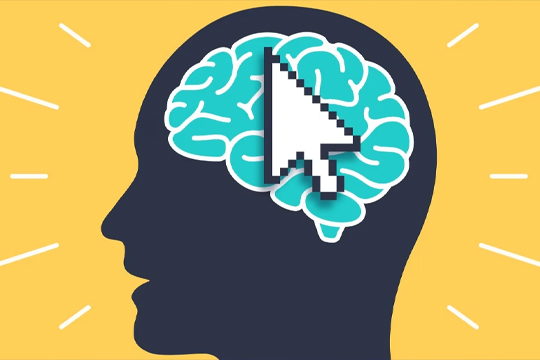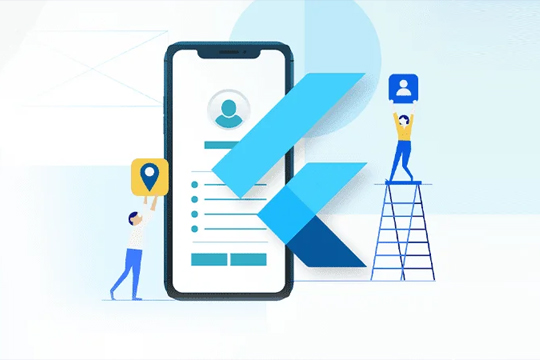Role of Human Psychology in UI/UX Design
Psychology plays a key role in shaping how users interact with an application in UX design. We can make changes…
Elearning apps have emerged as a game-changer in the education business in today’s fast-paced and technology-driven society. These apps are revolutionising the way we acquire knowledge and improve skills by providing a convenient and accessible learning experience. Elearning apps provide a flexible and personalised approach to education like never before, from students wanting additional support to professionals pursuing lifelong learning.
One of the primary benefits of elearning apps is the ease with which they facilitate the learning process. The days of tight timetables and physical classrooms are over. Learners can use elearning apps to access educational information from their smartphones, tablets, or PCs at any time and from any location. Individuals can learn at their own speed, tailoring their education around their hectic schedules and personal commitments. Whether you’re a working professional, a stay-at-home mom, or a student juggling numerous subjects, elearning apps allow you to learn on your own schedule.
Furthermore, elearning apps have considerably improved educational accessibility. They have broken down learning barriers, making education more inclusive and reaching learners who may not have had access to traditional educational institutions. Individuals from rural places, impoverished backgrounds, or with physical impairments can now access high-quality educational resources and engage in meaningful learning experiences thanks to elearning apps. This democratisation of education is changing lives and opening doors of opportunity for many students around the world.
Personalised learning has evolved as a powerful strategy in the field of education for catering to the specific requirements and preferences of individual learners. This notion has been taken to new heights with the introduction of elearning apps, which provide a genuinely personalised learning experience that adapts to the learner’s pace, style, and interests.
The concept of customization is central to personalised learning. Elearning apps use innovative technology and adaptive learning algorithms to personalise educational content and activities to the individual needs of each learner. These apps can dynamically change the learning route, delivering targeted support and challenges based on data on a learner’s performance, progress, and areas of strength and weakness.
Adaptive learning is an important part of a personalised learning experience. Elearning apps use adaptive technologies to determine the best learning strategy for each user. These apps ensure that learners receive content that matches their learning methods and preferences, whether through interactive multimedia, adaptive exams, or customised feedback.
The beauty of personalised learning is its potential to enable students to take charge of their education. It promotes self-directed learning and autonomy by allowing learners to investigate topics of interest and navigate their learning journey at their own speed.
Elearning apps respond to the various requirements and learning capacities of learners by providing individualised education. Personalised learning guarantees that instructional materials and activities are adapted to the learner’s preferred modality, whether they are auditory, visual, or kinesthetic. Learners can actively participate in their own learning process, which increases engagement and retention.
Elearning apps have widened the bounds of education in the digital age, offering global reach and fostering collaboration on an unprecedented scale. Learners and educators can connect across continents with these apps, transcending geographical boundaries and enjoying the richness of global learning experiences.
Elearning apps have enabled global learning by removing distance and accessibility obstacles. Learners can now gain access to educational resources, courses, and expertise from world-class universities and instructors. This worldwide reach provides a variety of perspectives, cultural insights, and a more comprehensive grasp of numerous issues. It broadens learners’ learning experiences by exposing them to new ideas, practises, and ways of thinking.
Another important component of elearning apps’ impact on global education is virtual cooperation. Learners from many countries and backgrounds can participate in collaborative projects, conversations, and group activities. They may interact, share ideas, and collaboratively solve problems using virtual collaboration tools, generating a sense of teamwork and cooperation. This virtual cooperation simulates real-world professional circumstances, preparing students for worldwide jobs and promotes cross-cultural understanding.
Global learning, assisted by elearning apps, includes cultural interchange. Individuals get insights into different traditions, perspectives, and societal norms by interacting with learners from various cultures and backgrounds. This exposure fosters cultural sensitivity, tolerance, and appreciation, which is vital in today’s interconnected world.
Elearning apps have transformed the education scene by providing low-cost education solutions and scalable learning platforms. These apps have changed the way we think about educational costs and accessibility, making high-quality education more inexpensive and accessible to a wider audience.
One of the primary benefits of elearning apps is their low cost. Tuition, textbooks, and other expenses are frequently associated with traditional schooling. Elearning apps are a more cost-effective option, allowing low-cost or even free access to educational resources, courses, and materials. Learners can save money on transportation, lodging, and other expenditures involved with attending physical classes. This low-cost education paradigm ensures that students from all socioeconomic backgrounds have equal access to high-quality education.
Another amazing attribute of elearning apps is their scalability. These platforms can accommodate a big number of learners at the same time, making education available to a large number of people. Elearning apps can scale to fit the needs of a small group of learners or a large online course with thousands of participants. This scalability allows educational institutions, trainers, and organisations to reach a larger audience, increasing their effect and removing capacity constraints.
The low cost and scalability of elearning programmes have democratised education, opening doors of opportunity for students all around the world. It has enabled people to pursue education at their own speed, on their own terms, and without regard for financial or geographical constraints. Elearning apps have actually turned education into a more inclusive, cost-effective, and scalable endeavour, paving the way for a more promising future in which quality education is available to all.
While elearning apps have made significant advances in the education business, they are not without limitations. It is critical to recognise and solve these difficulties while also anticipating future trends that will impact the educational landscape.
Providing equal access and bridging the digital gap is one of the most significant difficulties of elearning. While elearning apps provide convenience and flexibility, not all students have dependable internet access or the appropriate hardware. Efforts must be taken to provide inexpensive internet connection and to make educational resources available to all people, regardless of socioeconomic status or geographic location.
Maintaining learner interest and motivation in virtual learning environments is another difficulty. To keep learners actively engaged in their educational path, elearning apps must constantly innovate and offer interactive and engaging material. It is critical to establish a balance between technology and human engagement in order to foster meaningful connections between students and teachers.
Future elearning trends include the incorporation of virtual reality (VR) in education. By delivering immersive and engaging experiences, virtual reality has the potential to revolutionise learning. Learners can use VR to explore historical places, participate in realistic simulations, and interact with 3D models, improving their learning and retention of knowledge.
To summarise, while elearning apps have made great advances in altering education, issues such as access and learner engagement must be addressed. Future advancements, such as the use of virtual reality, show great promise for improving the educational experience. We can design a future where elearning is more accessible, engaging, and impactful by tackling these obstacles and embracing emerging technology.
Ndimension Labs is a major provider of digital solutions, including eLearning mobile and web application development. They provide full services to construct strong and user-friendly eLearning platforms based on their expertise and experience in the sector.
Ndimension Labs understands the specific needs of eLearning apps and collaborates closely with clients to provide customised solutions. Their professional development, design, and project management teams work together to produce intuitive and engaging interfaces that improve the learning experience.
Ndimension Labs focuses on establishing a smooth user interface (UI) and user experience (UX) when developing eLearning mobile and web applications. They place an emphasis on user-centric design concepts to guarantee that learners can effortlessly navigate the platform, access content, and interact with various features. The applications are optimised for various platforms, ensuring a consistent user experience across smartphones, tablets, and laptops.
Ndimension Labs develops scalable and feature-rich eLearning apps using cutting-edge technologies. They combine multimedia components, interactive assessments, progress monitoring, and other features to improve learner engagement and knowledge retention. They can also include gamification features to make the learning process more interesting and motivational for users.
Ndimension Labs guarantees a collaborative approach throughout the development process, keeping clients active and informed. To create reliable and high-performing eLearning programmes, they do extensive testing and quality assurance.
In conclusion, Ndimension Labs is dedicated to assisting clients in developing custom eLearning mobile and web applications. They provide end-to-end solutions to create immersive and effective eLearning platforms, leveraging their skills in UI/UX design, technology integration, and a client-centric approach.

Psychology plays a key role in shaping how users interact with an application in UX design. We can make changes…

Software development kits and frameworks are developing at the same rapid rate as mobile app development. The creation of mobile…

One of the most annoying things that can make people stop using your resource, cost you money, and damage your…